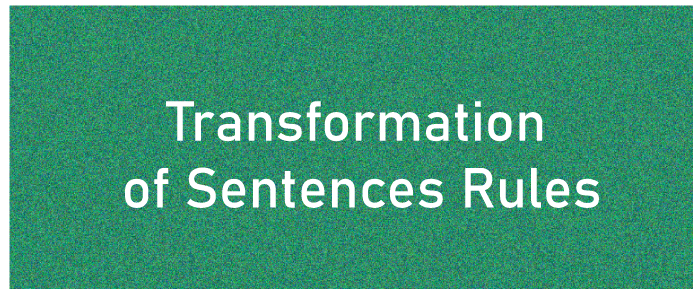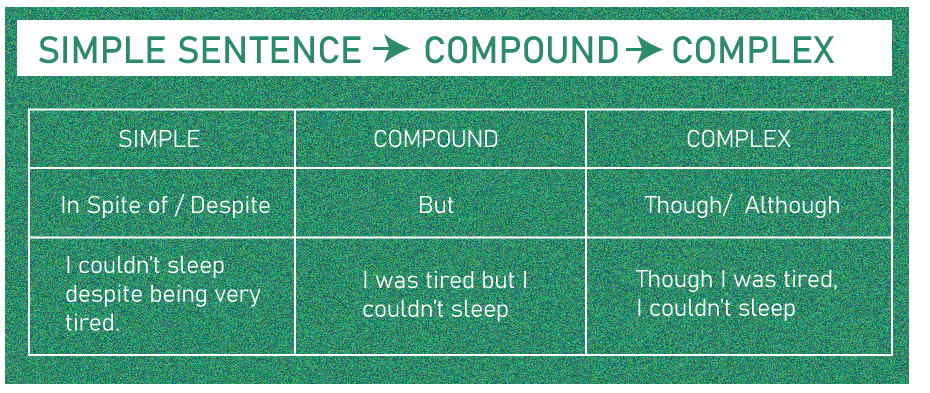Transformation Of Sentences RulesTo transform a sentence implies altering its pattern/ structure without altering its meaning. A simple sentence can be altered to become a complicated or compound sentence and vice versa. Similarly, positive, negative, and exclamatory statements can be interchanged without altering their meaning. 
Some examples of sentence transformations are provided below. The technique of modifying the form of a statement without changing its core meaning is known as Transformation. It allows people to convey the same thing in numerous ways without changing the meaning. As an example :
In another example ;
In another example ;
In another example
Different variations of the same sentence have been provided in these sentences. Even if their forms are different, their message is the same. Kinds of Sentence TransformationThere are 3 kinds of sentence transformation. These are the -
What Exactly Is a Clause?Clauses are those parts of a sentence that have a subject and a predicate as a collection of words, but it is not regarded as a complete sentence. There are 2 types of clauses. These are the - 1. Independent Clause:An independent clause is one that -
For example, we went to Jaipur but did not visit the Dargah . 2. Dependent Clause:These clauses are dependent on another clause in the sentence.
To comprehend the many forms of sentence transformations, we must first define Simple Sentences, Complex Sentences, and Compound Sentences. Simple Sentence: These sentences are those that comprise of only one independent clause. Example: He admitted his unlawful practice. Complex Sentence: These sentences are those that contain one clause and one or more subordinate clauses. Example: He admitted that he was responsible for his unlawful practice. Compound Sentence: These sentences are those that include more than one primary clause in it. For example, I went to see Avengers, but the theater was already full. Changing Simple Sentences to Complex SentencesChanging or transforming Simple Sentences into Complex Sentences is simple. This is accomplished by just expanding a term or phrase into a clause. So, one can utilize the same procedure to convert Complex Sentences to Simple Sentences. This can be accomplished by converting a clause into a word or phrase. A few instances are provided below to help you grasp the concept and the typical rules for changing between Simple and Complex Sentences: 
Transformation Of Sentences RulesTransforming of sentences can be done correctly by following its rules and guidelines. Read on to know the rules of Transformation Of Sentences Rule: 1 "Present participle" in a simple statement, can be transformed into complex statements by introducing the terms like "since/as/when" at the beginning of the statement. Simple Sentence: Shutting the gate, I went back to college. Complex Sentence: When I shut the gate, I went back to college. Rule: 2 "Being/ Verb+ ing" in a simple sentence, to transform into a complex one can be done by introducing the terms like "as/when/since" in the beginning portion of the sentence. Simple Sentence: After getting the beauty pageant crown, she burst into tears. Complex Sentence: As she got the beauty pageant crown, she burst into tears. Rule: 3 "Too…to" in a simple sentence, to transform into a complex sentence by introducing the term "so…that (negative)". Simple Sentence: He is too frail to lift the container. Complex Sentence: He is so frail that he cannot lift the container. Rule: 4 To change a simple sentence into a complex sentence, introduce the term "so that" to the sentence . Simple Sentence: We work to survive. Complex Sentence: We work so that we can survive Rule: 5 To transform a simple sentence "in spite of/ notwithstanding" into a complicated one, introduce the terms "though/ although" to the sentence. Simple Sentence: In spite of being wealthy, he is diligent. Complex Sentence: Though he is wealthy, he is diligent . Rule: 6 In the simple statement, introduce "because of" at the start of the sentence to change it into a complex one. Simple Sentence: Because of her sickness, she could not attend the session. Complex Sentence: Since she was sick, she could not attend the session. Rule: 7 For a simple sentence of "subject + verb + object + present participle," transform it to a complex sentence of "subject + verb + object + relative pronoun of the object + be verb as per relative pronoun and tense + rest of the phrase. " Simple Sentence: I noticed a kite soaring by. Complex Sentence: I noticed a kite which was soaring. Rule: 8 The simple sentence, which begins with "without," is transformed into a complex sentence by introducing "if/ in case. " Simple Sentence: Without incorporating the salt, the soup will taste terrible. Complex Sentence: If you do not incorporate salt, the soup will terrible. Rule: 9 In the simple sentence, the term "at the time" can be transformed from "at the time" to when in the complex statements. Simple Sentence: Helen got up at the point of the power cut. Complex Sentence: Helen got up when there was a power cut. Rule: 10 In the complex sentence, "adjective" in the simple sentence will be translated to "that/which" in the complicated statement. Simple Sentence: It was a green hoody. Complex Sentence: It was a hoody that was green. Transformation From Affirmative To NegativeSentence transformation is the process of modifying the structure of a sentence without altering its meaning. The sentence's meaning stays consistent, but the sentence form can be changed. In this post, we'll look at how to alter a sentence without changing its meaning. Rule-01 Affirmative to Negative If there is 'only' or 'alone' in an affirmative statement and it relates to Jesus / deity or an individual, then 'None but' must be used at the start of the answer sentence rather than 'only' or 'alone'. Examples ; Affirmative: Only Lord Jesus can guide us. Negative: None But Lord Jesus can guide us. Affirmative: Only John can do the task. Negative: None, but John is capable of completing the task. Rule-2 If "only/alone" denotes an object in the affirmative phrase, it should be eliminated and "nothing but" substituted in its place. Examples - Affirmative: A kid likes only desserts. Negative: A kid likes nothing but desserts. Affirmative: John enjoys only coffee. Negative: He enjoys nothing but coffee. Rule-3 If "only" refers to a number in a sentence, use "not more than" or "not less than" in the reply sentence rather than "only." Examples - Affirmative: John is only nine. Negative: John is not less than nine. Affirmative: Johnny is only eighteen. Negative: Johnny is not more than twenty-two. Transformation Of Assertive To InterrogativeThe rule of converting an assertive sentence to an interrogative sentence without affecting the meaning. These rules can be explained using examples- Assertive: Jack is absent from the conference. Interrogative: Isn't Jack absent from the conference ? Assertive: She is not a poor person. Interrogative: Is she a poor person ? Assertive: He loves rugby. Interrogative: Does he love rugby ? Assertive: I never eat maida. Interrogative: Do I ever eat maida ? Assertive: Everyone despises dishonesty. Interrogative: Who doesn't despise dishonesty ? Assertive: every guy must suffer. Interrogative: Is there any individual alive who will not suffer ? Exclamation to Assertive (Transformation of Sentences)It is relatively straightforward to transition from exclamatory to assertive. Just consider the following examples: Exclamatory: What a beautiful dress ! Assertive: It is a very beautiful dress. Exclamatory: Hurrah! The match has been won by us. Assertive: It is a matter of happiness that we have triumphed the match . Assertive to Exclamatory (Transformation of Sentences)Let us look at the Structure: What/How+ Adjective+ Subject+ Verb+ Extension( if any)+ Exclamation. If we study examples, this structure will become apparent. Assertive: It is a very big landscape. Exclamatory: What a big landscape it is ! Assertive: The lawn is very lovely. Exclamatory: What a lovely garden ! Assertive to ImperativeIn the Imperative sentence, use the second Person criterion. Examples - Assertive: You must do the project. Imperative: Do the project. Assertive: You should never be dishonest. Imperative: Never be dishonest. For the 1st and 3rd persons rule in the Imperative sentence. Let us look at a few examples - Assertive: She enjoys basketball. Imperative: Let her enjoy basketball. Thus Transformation can be of various kinds, and following the rules can help make the Transformation easy and simple.
Next TopicGerund
|
 For Videos Join Our Youtube Channel: Join Now
For Videos Join Our Youtube Channel: Join Now
Feedback
- Send your Feedback to [email protected]
Help Others, Please Share









